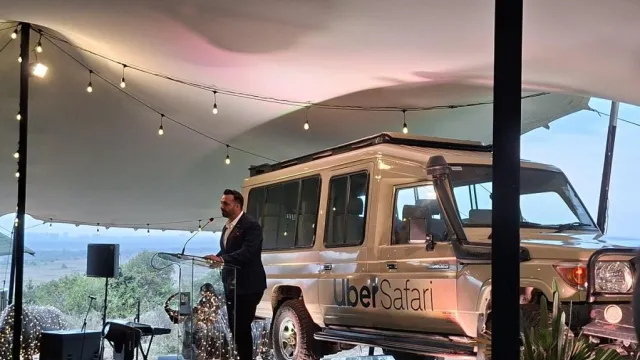Travel agents on edge as Uber Safari debuts in Nairobi

Uber Technologies head of business development in East Africa Imran Manji noted that the service offers both "accessibility and simplicity that people associate with Uber and bring it to the safari space."
Uber, the trailblazer that revolutionized the taxi business in Nairobi, now aims at transforming Kenya's safari tour scene with a bold new service that lets tourists book guided game drives in the Nairobi National Park.
According to Uber Technologies, tourists can now book a three-hour guided game drive in the park at a charge of $190 (approximately KES25,000) for up to four passengers. This cost is tailored to cover transport, entry fees and professional guide in the wildlife ecosystem adjacent to Nairobi city.
In an update, Uber Technologies said the service is in collaboration with the Kenya wildlife Service and other local operators and is part of ongoing initiatives in the transport industry.
Uber's head of business development in East Africa Imran Manji noted that the service offers both "accessibility and simplicity that people associate with Uber and bring it to the safari space."
"The Nairobi National Park, combined with our technology, is what inspired this product," added Manji.
Uber Safari, an offering which is in use in South Africa, aims to make safaris in more affordable and accessible to an increasing number of both local and foreign tourists.
While proponents highlight its convenience for business travelers and potential to boost park visits—given that 80 percent of Kenyans have never visited a national park, travel agents have called for equal playing field with the entry of Uber Safari business model.
In an update last week, the Kenya Association of Travel Agents (KATA) noted that, "Such models [Uber Safari] risk undermining the role of professional safari guides, lowering established safety and service standards, and potentially disrupting conservation and park management systems that rely on regulated operations. More subtly, they also risk diluting the unique, world-class visitor experience that makes destinations like Kenya a premier safari hub."
KATA added, "Safari tourism is unlike ordinary transport. It is bound up with conservation, community livelihoods, and the integrity of national heritage. Regulators will need to ensure that technology-driven entrants meet the same licensing, safety, and guiding requirements as traditional operators."
Equally, critics on X express concerns over revenue diversion to a foreign company and possible strain on local businesses and the park's ecosystem.
"Now there is Uber Safari? I have mixed feelings about this. I don't recommend it in our country. Pesa ya tourism itaenda to foreign companies," @Osama_Otero posted on X.
"They have come to kill tour business as well after ruining taxi business with ridiculously low rates. Let Uber deploy their own vehicles and employ drivers to prove the success of their initiatives," noted @gmagak while @KSaphira added, "Tourism needs to be left to local businesses not multinationals. This is wrong on so many levels."
In Kenya, safari tour vans are the main mode of transport for groups of tourists heading to popular destinations such as the Nairobi National Park, Maasai Mara and the Amboseli.
Peak period
For many players in Kenya's roughly $4 billion (KES516 billion) tourism industry, often locally-owned small-scale businesses, the peak period for safari tours is between July and October when the Maasai Mara ecosystem experiences wildbeast migration from neighbouring Serengeti National Park in Tanzania.
According to a 2024 Go2Africa report, Kenya's safari tourism supports over 1,000 registered tour operators, many using 5–20 vans each, implying a fleet in the thousands.
Established in 2009, Uber introduced a mobile app that replaced street hailing and dispatcher calls, allowing millions of users across cities to book rides with just a few taps.
The firm's GPS integration enables real-time driver tracking by customers, estimated arrival times, and seamless payments using platforms like M-PESA unlike traditional taxi systems that heavily depend on cash.
Over the years, Uber's convenience has boosted customer adoption, with the company reporting over 1.7 billion trips globally by 2023.
In Kenya, the app’s accessibility via smartphones continues to enhance mobility in urban areas, a trend that is now likely to stir the country's traditional safari booking platforms.





